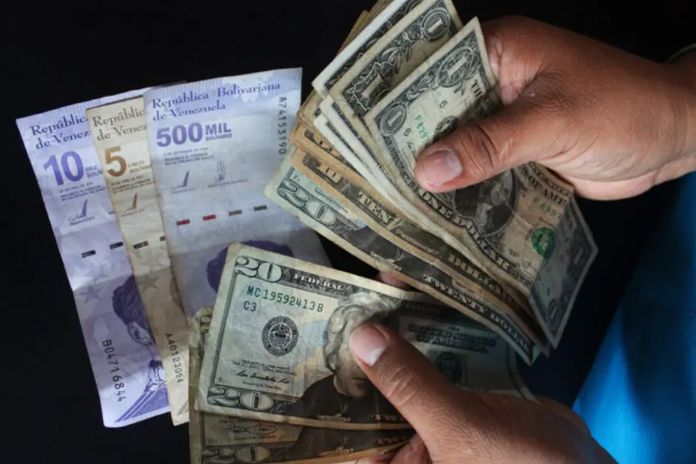- The black market exchange rate has been 15-20 percent above the official one in recent days.
By Ricardo Vaz
CARACAS, (venezuelanalysis.com) – Venezuelan authorities have stepped up efforts to maintain a stable exchange rate between the country’s bolívar and the US dollar.
A parallel marker has risen in recent weeks with respect to the official one set by the Venezuelan Central Bank (BCV). Last week, the gap reached 20 percent before receding to 17 percent on Friday. The so-called “Monitor Dolar,” which averages several unofficial exchange rates, stood at 42.86 bolívares per USD, compared to the 36.65 set by the BCV.
The difference between the two rates fuels speculation, with operators looking to buy US currency at the official price before selling at the parallel one for a quick turnaround. In addition, most businesses use the higher, black market value in their cost structures, either raising prices in bolívares or charging customers at the parallel rate.
Venezuela’s consumer rights watchdog SUNDDE deployed inspection teams following complaints that retailers were charging at the black market rate and set up an online portal for users to denounce similar occurrences.
For its part, the BCV has ramped up its injections of foreign currency into so-called “exchange tables” run by public and private banks. The financial authority provided US $180 million in a single intervention last week and has provided more than $3.6 billion so far this year, according to specialized portal Banca y Negocios. The figure is 15 percent higher than the corresponding amount in 2023.
In 2021, the Nicolás Maduro government lifted currency exchange controls as part of a package of liberal measures aimed at controlling inflation and jumpstarting the economy amidst wide-reaching US sanctions targeting sectors such as banking, mining and especially the oil industry.
Though in theory the current forex system is based on supply and demand, the BCV remains the biggest provider of foreign currency.
With the bolívar’s devaluation historically correlated with inflation, Venezuelan authorities are looking to preserve the recent progress that has seen 12-month inflation stand at 43.7 percent, the lowest mark since mid-2013. The accumulated figure between January and July 2024 is 9.7 percent.
Alongside currency injections, the Maduro government has likewise aimed to tackle inflation by freezing salaries and restricting credit.
The minimum wage has not been raised since March 2022, with authorities instead relying on bonuses. Trade unions have repeatedly denounced that the policy fosters inequality by favoring employers, since vacation pay, social security, severance and other labor costs get cheaper.
A recent study by the Finanzas Digital website also found that Venezuela has the smallest amount of circulating credit in all of Latin America. Despite nearly doubling over the last 12 months, the Caribbean nation’s figure remains under $2 billion, around 1.3 percent of the corresponding amount for neighboring Colombia.
The Maduro administration recently announced its intent to lower the leverage or legal reserve ratio demands to improve credit options for small businesses. Venezuelan banks presently can only lend 27 bolívares for every 100 in its deposits.
Economist Luis Gavazut stated that the upcoming measures will allow financial institutions to increase the loan amounts based on their reserves but that they will remain forbidden from issuing credit by creating new money in circulation.
Despite Washington’s hardening of sanctions in April and the recent exchange rate pressure, the Venezuelan economy has continued to report growth. According to the BCV, the country’s GDP increased by 8.4 and 8.8 percent in the first and second trimesters, measured with respect to the same period in 2023.
The central bank has now registered 13 consecutive quarters of GDP improvement dating back to the end of 2021. For its part, the Maduro government has expressed confidence that the economy’s growth can reach double digits for 2024. It would mark a fourth straight year of GDP recovery following seven years of recession.
However, given the scale of the economy’s contraction, Venezuela would require 12 more years of 10 percent growth to return to 2013’s GDP level.





